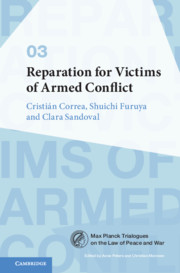Reparation for Victims of Armed Conflict
Are victims of armed conflict entitled to reparation, which legal rules govern the question, and how can reparation be implemented? These key questions of transitional justice are examined by three scholars whose professional, theoretical, and methodological backgrounds and outlooks differ greatly. They discuss how regional human rights case law, international criminal law, the practice of ad hoc international bodies, and domestic practice give rise to a right to reparation. This right emerges out of the interplay between international and domestic law. The problems of mass claims, fragile statehood, and the high risk of marginalisation of particular groups of victims are addressed. The analysis is alert to the current backlash against international legal institutions, and to the practical constraints in making post-conflict law work. The multiperspectivism of the trialogical setting exposes the divergence and complementarity of the authors’ approaches and leads to a richer understanding of the law of reparation. This title is also available as open access on Cambridge Core.
Cristián Correa is a senior expert at the International Center for Transitional Justice. He works on how to address the consequences of massive human rights violations in countries such as Côte d’Ivoire, Kenya, Sri Lanka, Colombia, Mexico, and Peru. Before, he faced similar challenges as an advisor at the Presidency of Chile and at the National Commission on Political Imprisonment and Torture.
Shuichi Furuya is a professor at Waseda Law School, and a member of the UN Human Rights Committee and of the International Humanitarian Fact-Finding Commission under the 1st Additional Protocol to the Geneva Conventions. He was a Co-Rapporteur of the ILA Committee on Reparation for Victims of Armed Conflict (2004–14). From the perspective of both international human rights law and humanitarian law, he is an expert on reparations issues.
Clara Sandoval is a professor at the School of Law and Human Rights Centre at the University of Essex. She also teaches at the Geneva Academy. Clara has served as an expert on reparation before international tribunals such as the ICC and the Inter-American Court. She litigates before the Inter-American System, and has worked as a consultant for various UN bodies on reparation questions.

